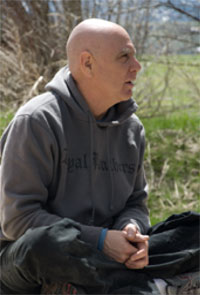In my continuing project to identify instances of honest Buddhist thought appearing in Western culture, I would like to discuss the writer Lydia Davis today. Davis is a short story writer whose work blends poetry, philosophy and fiction. Many of her pieces are only a page long, or a sentences or two. I came across the following story in her 2002 collection, Samuel Johnson Is Indignant. The story, typed below in its entirety, is called “New Year’s Resolution.”
“I ask my friend Bob what his New Year’s Resolutions are and he says, with a shrug (indicating that this is obvious or not surprising): to drink less, to lose weight… He asks me the same, but I am not ready to answer him yet. I have been studying my Zen again, in a mild way, out of desperation over the holidays, though mild desperation. A medal or a rotten tomato, it’s all the same, says the book I have been reading. After a few days consideration, I think the most truthful answer to my friend Bob would be: My New Year’s Resolution is to learn to see myself as nothing. Is this competitive? He wants to lose some weight, I want to learn to see myself as nothing. Of course, to be competitive is not in keeping with any Buddhist philosophy. A true nothing is not competitive. But I don’t think I’m being competitive when I say it. I am feeling truly humble, at that moment. Or I think I am—in fact, can anyone be truly humble at the moment they say they want to learn to be nothing? But there is another problem, which I have been wanting to describe to Bob for a few weeks now: at last, halfway through your life, you are smart enough to see that it all amounts to nothing, even success amounts to nothing. But how does a person learn to see herself as nothing when she has already had so much trouble learning to see herself as something in the first place? It’s so confusing. You spend the first half of your life learning that you are something after all, now you have to spend the second half learning to see yourself as nothing. You have been a negative nothing, now you want to be a positive nothing. I have begun trying, in these first days of the New Year, but so far it’s pretty difficult. I’m pretty close to nothing all morning, but by late afternoon what is in me that is something starts throwing its weight around. This happens many days. By evening, I’m full of something and it’s often something nasty and pushy. So what I think at this point is that I’m aiming too high, that maybe nothing is too much, to begin with. Maybe for now I should just try, each day, to be a little less that I usually am.”
I appreciated Davis’s style, her whole approach to writing. She has certainly written longer stories, but much of her work, such as the above flash fiction (though I am not a fan of that term because, well, it’s too flashy), I would in fact categorize as Buddhist in nature. What might that even mean? Well, perhaps mindful, heartfelt, psychological/philosophical, concentrated in form.
Certainly Davis brings her own questions to the table here: Does the Buddhist approach to life essential amount to a continual effort to be a little less that we usually are? A little closer to nothing than we were the day before? Isn’t that the idea? Om gate gate?
And I would raise my own questions about writing in general—and about fiction writing in particular—in response to this piece: How does a Buddhist approach the art of narrative? How does one begin to tell one’s story, or the story of others, when the emphasis of the view is always to let go of the idea of self altogether? How does one express one’s self without a firm sense of ego and ego’s ambition?
I know there are some fiction and narrative writers out there, and plenty of fiction and narrative readers, too. What do you think? Lastly, for what it’s worth, this question is not theoretical for me—it affects how I approach my work at the writing desk each and every day.
More from Beliefnet and our partners

